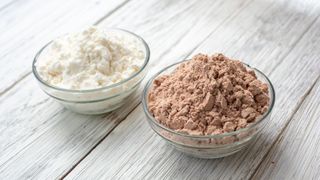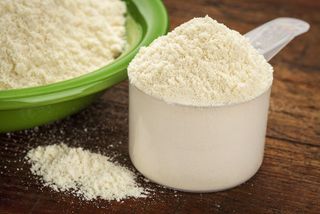Collagen vs whey protein: Which is better for your health goals?
When it comes to collagen vs whey protein, which is better for your fitness routine and nutritional needs?

The fight is on: collagen vs whey protein. But which one is better for improving muscle development and overall health? What are the pros and cons of each? And, how do you know which supplement will suit you best? Read on to discover more about each of these popular protein powders.
The best protein powders (or best vegan protein powders if you are plant-based) can help you feel fuller for longer, boost your metabolism and build lean muscle. Whey protein powder seems to have conquered the market for athletes, bodybuilders and fitness enthusiasts, and its popularity is set to continue. Forecasters predict the global whey protein market will double to more than $18bn within just six years, according to data website Statista.
However, the new kid on the block, collagen powder, is gaining popularity, with claims that it can help you build muscle, lose weight, reduce inflammation and even improve your skin and hair. So, what are the differences between these two supplements, and which one might suit your nutritional needs best? Here’s the lowdown.
What is collagen?
Collagen is an essential protein the body needs to build and maintain the connective tissues in our muscles, skin and bones. It improves flexibility, supports major organs and boosts elasticity in the skin. The body produces plenty of collagen, especially during childhood and in younger adults.
Our body's collagen levels deplete as we age, at an average rate of 1% to 1.5% per year, according to the journal Plastic and Aesthetic Research. Lifestyle choices, smoking and exposure to UV rays from the sun can also deplete these levels. Results include wrinkles and sagging skin, weak muscles and joints, and gastrointestinal problems.

What is whey protein?
Whey protein is a by-product of the cheese-making process that provides essential building blocks to promote muscle growth, such as amino acids. According to the Mayo Clinic, whey protein may help to speed up muscle recovery after intense exercise and support weight gain in people who have trouble keeping on weight. It can also improve burn and wound healing.
“Whey protein is high in the amino acid leucine, which triggers muscle protein synthesis post-exercise, improving muscle development,” says Julie Stefanski, registered dietician and spokesperson for the Academy of Nutrition and Dietetics. “Adding whey protein improves wound healing and age-related muscle weakness.”

Julie Stefanski is a registered dietician and spokesperson for the Academy of Nutrition & Dietetics. She is a certified diabetes care and education specialist and a certified specialist in sports dietetics. Stefanski owns a private practice focused on writing and social media, children with special needs, and athletes.
Amino acids
Whey protein contains more branched amino acids, such as leucine, than collagen. According to a 2019 study on overweight women, these extra amino acids may contribute to the result that whey protein was more effective at increasing the women's resting metabolic rate than collagen supplements.
Absorption
Whey protein is widely known for being a fast-acting protein. In fact, according to a 2018 article in the Journal of the International Society of Sports Nutrition, the body can absorb 20g of whey protein in just two hours.
While collagen absorption research is in its infancy, it appears slower to absorb than whey protein. Hydrolyzing collagen breaks it down into smaller particles with a faster absorption rate. As a result, many supplements now contain hydrolyzed collagen.

Muscle mass
The key ingredient here is leucine again, more of which is in whey protein. Research has shown that leucine can help to increase muscle mass and strength, specifically in healthy older people.
“Leucine independently triggers muscle protein synthesis post-exercise, offering an additional boost to muscle growth,” says Stefanski.
Digestion
Collagen tends to win out on the digestion front. According to the Mayo Clinic, whey protein may cause gastrointestinal problems in some people, while collagen supplements are generally considered safe, with no known side-effects.
Satiety
The jury’s out on this one, despite claims that whey protein and collagen supplements can help curb appetite. In 2021, a randomized and double-blind study found that neither whey protein nor collagen helped reduce appetite in healthy women. However, in 2015 researchers found that adding whey protein to a regular diet could reduce appetite. So, we need more research to be sure.

Whey vs collagen: which should you take?
We asked Stefanski for her take on whether collagen or a whey protein supplement would be better.
“While some studies have shown benefits from supplementation with collagen or gelatin in areas of osteoarthritis and aging skin, the evidence is fairly weak, as many of the studies are small,” she says. “Many claims to support the use of collagen products have yet to be substantiated. When you dig into published research regarding collagen’s effects on joint pain, the evidence doesn’t support the claims or theories at this point.”
Stefanski is more optimistic about the beneficial effects of whey protein, however. “Extensive research supports the use of whey protein for muscle synthesis and the repair of skin damage. In addition, research comparing the effects of collagen versus whey protein on muscle growth after exercise finds that whey protein is the clear winner,” she says.
Stefanski has a warning for anyone thinking about taking a supplement: “Research the company and ensure there have been no issues with contamination of heavy metals or other substances. Look on the FDA website to see if the manufacturer has had any product recalls.”
This article is for informational purposes only and is not meant to offer medical advice.
Sign up for the Live Science daily newsletter now
Get the world’s most fascinating discoveries delivered straight to your inbox.
Joanne Lewsley is a UK-based freelance writer and editor, covering health and lifestyle news and features. She mainly creates evidence-based health and parenting content and has worked with a number of global sites, including BabyCentre UK, Medical News Today, Fit & Well, Top Ten Reviews, and Yahoo!

